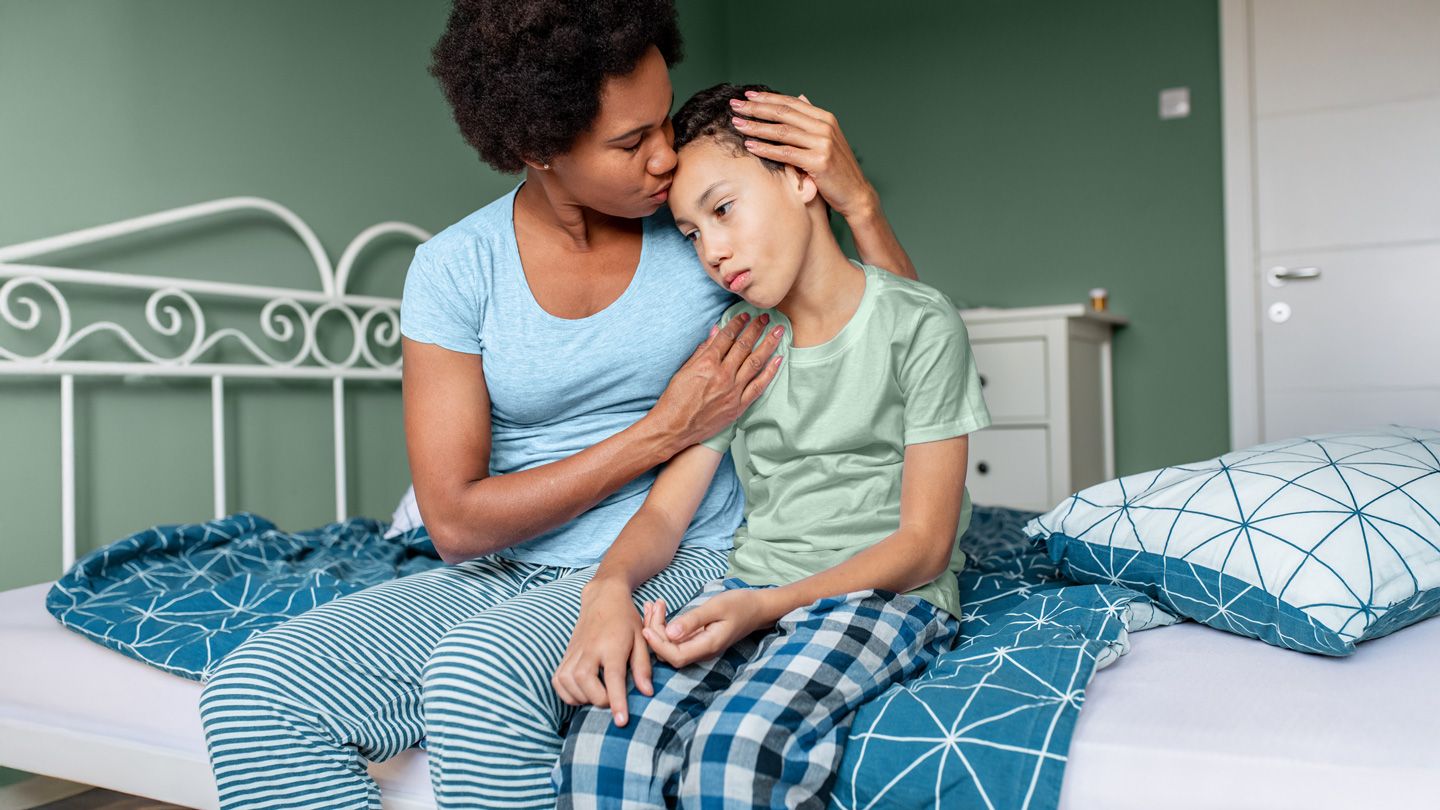Learning that your child has a pediatric low-grade glioma (pLGG) — a slow-growing, cancerous brain or spinal tumor — is hard enough as a parent. But breaking the news to your child and explaining what it means can be even tougher.
“No parent wants to be in this position, but if it’s the reality, you are your child’s best guide into what’s happening,” says Mustafa Barbour, MD, a pediatric neuro-oncologist at Norton Children’s Cancer Institute in Louisville, Kentucky. “While parents might be tempted to keep information from their child, we find that openly discussing the diagnosis, different treatment options, and expected outcomes from the beginning allows them to cope with the uncertainty,” he says.
For younger children, establishing a dialogue gives them the opportunity to talk about their fears. For older kids and teens, being open gives them time to explore the disease and some ownership over the process.
No matter what, cancer conversations aren’t easy. But the tips below can help. Use them to navigate talking about pLGG with your child.
1. Simply Define the Cancer
When explaining what pLGG is, try to stay calm, because your child will take their cues from you. You may want to have the conversation privately or with another family member present.
2. Be Prepared for Tough Questions
Try to anticipate questions your child may ask, and craft reassuring but truthful answers, such as:
- Did I “catch” cancer from someone? No, and you can’t spread it to anyone either.
- Did I do something to cause cancer? No, doctors don’t know what causes pLGG, but they do know how to treat it.
- Will it hurt? Treatments can sometimes hurt, but people on your care team will help keep you comfortable.
- Am I going to die? We hope the medicine will get rid of the cancer. The treatment rate for pLGG is very successful.
3. Ask Your Child How They Feel
Every child is different in how they deal with stress. That said, most children do better if they understand what’s happening and why they must go through surgery and treatments for pLGG. “Regardless of age, this is a scary diagnosis,” says Barbour. “That’s why it’s important to listen to their questions and discuss their fears.”
4. Discuss the Symptoms
Symptoms of pLGG vary widely, depending on the location of the tumor, and may change over time. Be open with your child about the symptoms they are facing or may face, such as issues with balance, bad headaches, or trouble walking. “It’s important to be gentle but honest,” says Barbour. “It’s also important to encourage your child to tell you and their care team if their symptoms change or get worse.”
5. Explain the Treatment Process and Potential Side Effects
Treatment for pLGG is different from person to person. “Some will need surgery, chemotherapy, targeted therapy, or radiation. Each of these will create a different experience and side effects,” says Barbour. Knowing and discussing the plan with your child will help them navigate the treatment process and know what to expect.
6. Have Many Short Talks
A cancer diagnosis will likely feel overwhelming for your child. Instead of an in-depth, onetime conversation, have many short talks about pLGG. This allows your child to process what’s happening and ask questions — even if you don’t have answers for them at the moment. “If your child feels you’re being honest with them, they’re more likely to be honest with you,” Barbour notes. Know that you can say, “I don’t know,” if you don’t have an answer for your child’s question. Explain that you can find out the answer together.
7. Empower Your Child to Ask Their Own Questions
If your child is old enough, encourage them to ask their care team questions themselves. This can help them feel like they have more control over what’s happening.
8. Ask the Care Team Questions on Your Child’s Behalf
Your child may not feel comfortable asking their doctor questions directly. If that’s the case, write down their questions and bring them up at the next doctor’s appointment, Barbour suggests. “It’s okay to reassure your child that there are no wrong or bad questions, and that everyone — from the doctors to the nurses to child-life specialists — is there to help them understand,” he adds.
9. Remember to Support Your Child’s Siblings
A tumor diagnosis is also hard on siblings. They may feel scared that they’re going to get sick, too. Or they may be worried that something may happen to their loved one.
Keep communication open with siblings in an age-appropriate way. Your child’s social worker can also be a great resource for sibling support, says Clay Culp, DSW, LCSW, a social worker at St. Jude Children’s Research Hospital in Memphis, Tennessee.
Other Tips for Parents
As a parent, you are a crucial part of your child’s cancer care team. Keep these points in mind during your child’s pLGG treatment journey:
- Educate yourself about pLGG and its treatments. Work with your child’s care team to understand the disease. “There are different treatment options for pLGG, and parents should ask questions and educate themselves, so they can choose the right approach for their child,” says Barbour. Be open about any concerns you have.
- Utilize available resources. Your child’s hospital likely has a wealth of resources available to you. Connect with child-life specialists, social workers, and mental health providers to talk through how to communicate with your child, as well as their siblings and classmates.
- Ask your child’s cancer care team for help. “Open communication is very important throughout the entire process,” Barbour stresses. Remember, the team is here to support you and your child at this critical time.
- Take care of yourself, too. Try not to neglect your own emotions and worries. “Talk to your care team, a mental health professional, or even connect with other families facing pLGG,” Barbour suggests. This will make you feel less isolated and put you in a better position to care for your child throughout their cancer journey.
The Takeaway
- When your child is diagnosed with pLGG, try to explain it in an age-appropriate way, and encourage them to ask questions.
- Educate yourself about the condition and keep in close touch with your child’s cancer care team to help you answer any questions that come up.
- Have open, ongoing conversations with your child about how they are feeling, and help relay their questions to the cancer care team.
Read the full article here




